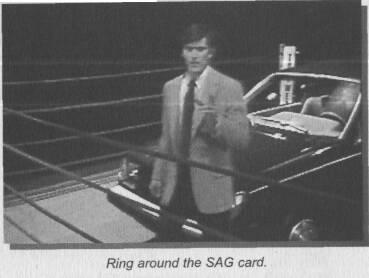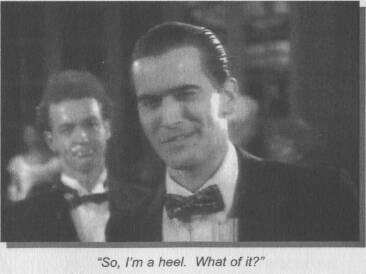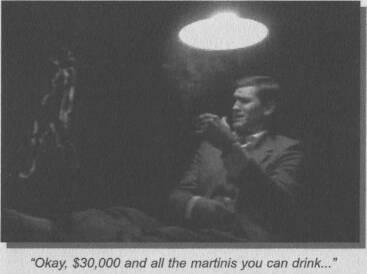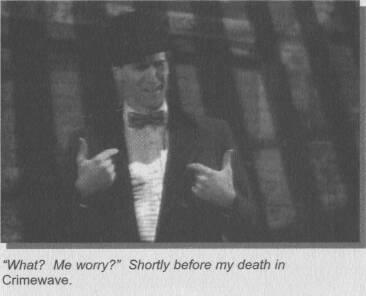If Chins Could Kill: Confessions of a B Movie Actor (29 page)
Read If Chins Could Kill: Confessions of a B Movie Actor Online
Authors: Bruce Campbell
Tags: #Autobiography, #United States, #General, #Biography & Autobiography, #Biography, #Entertainment & Performing Arts - General, #Entertainment & Performing Arts, #Actors, #Performing Arts, #Entertainment & Performing Arts - Actors & Actresses, #1958-, #History & Criticism, #Film & Video, #Bruce, #Motion picture actors and actr, #Film & Video - History & Criticism, #Campbell, #Motion picture actors and actresses - United States, #Film & Video - General, #Motion picture actors and actresses

"What are you doing here?" he asked. "Get me a cup of coffee."
"Get your own damn coffee," I shot back. "I've stepped in
front
of the camera, pal -- I'm a movie star. You gonna hire me or not?"
He did, and my first union job was portraying a car salesman with an interesting twist. My character, suit and all, was in a boxing ring next to a Chrysler -- the car of choice. When the bell rang, I'd leap out of the corner, weaving, bobbing and jabbing the opponent (a salesman for Ford in another ring) with sales-friendly praise for my car.
There is nothing harder than memorizing technical jargon -- phrases like, "Let's not overlook the McPherson Strut Suspension" don't exactly roll off the tongue. Still, that first job filmed for twenty hours and the union overtime alone paid for all of my Screen Actors Guild dues. I was happy to be back in familiar territory, only with a new and improved status -- I wasn't fetching coffee anymore, I was having it fetched for me.
28
THE FIRST "HOLLYWOOD" FILM
"THE TERROR THAT ATE MOTOWN"
It was time for another flick. I was a card-carrying actor now, damn it all, and the boys and I were gonna go "Hollywood."
Sam had concocted an idea about two crazed killers several years prior to this, calling it
Relentless.
He recruited his new pals, the Coen Brothers, to assist him in fleshing out the script.
Sam: Edna, our editor, said, "You've gotta read the Coen boys' scripts -- they're such good writers." I went, "Oh God."
Bruce: "Here goes another one."
Sam: You know, Joel's brother, Ethan, was just a statistical accountant at Macy's at the time, and I thought it's probably going to be awful, but I'll read it because I like Joel. And I read it and I thought, "This is really a great script. These guys know how to write scripts." I needed help, because ours was no good and they came in and helped me with it.
The plot became one that Hitchcock used often: a mild-mannered leading man (a security camera installer in this case) gets caught up in a web of fear, murder and mayhem.
Mentor Irvin Shapiro had a hand in devising a new title for the film. He figured that putting the letter "X" and the word "Murder" in the title would somehow draw the eye of moviegoers. Who were we to doubt this man?
The film became
The XYX Murders
and based on the strength of
Evil Dead,
financing fell into place.
At the time, we had no idea how good of an experience
Evil Dead
was. Sure, we burned off four years of our lives and didn't pocket a cent, but we had total creative control. Jumping into the big time meant dealing with the excruciatingly specific and alternately vague demands of a studio -- unlike Michigan dentists, Hollywood executives took an interest in
everything.
Embassy Pictures, our new boss, was the brainchild of TV guru Norman Lear. His Midas touch, it was assumed, would translate to full-length films.
Crimewave
(the new title, complements of Embassy's marketing department) ended up being more like a master's degree in humility than a film. All along, it was assumed that I would play the lead role of Vic, but a particularly intransigent executive at Embassy Pictures saw things differently and insisted on a screen test.
Why do I have to test for this thing?
I asked myself.
I didn't have to test for
Evil Dead.
So, in Mike Ditz's photo studio (where else?) we staged a scene on 16mm and presented it to the execs for consideration. An edict came down from on high: Bruce Campbell will
not
star in this film.
Up to this point, we had never heard the word "no" in the context of filmmaking. Graciously, Sam offered to beef up a secondary role for me -- Renaldo "the Heel." As a coproducer of the film, less screen time allowed me to take a more active role behind-the-scenes; this was a good thing, because we needed all the production help we could get.
THE HOLLYWOOD ACTOR
Crimewave
provided the first opportunity to deal with this odd breed of human. The studio insisted that "name" actors be cast in the lead roles because this would allow the film to be sold around the world.
That's odd,
I remember thinking,
didn't we just do that with a cast of no-name actors?
With a starting budget of 2.5 million, the expectations were a little higher -- the film
had
to sell well, so the main roles were cast out of Los Angeles.
As well as being expensive, each "Hollywood" actor we hired had, shall we say, "unique qualities." Because I was a coproducer and a part-time actor, I found myself dealing with the actors; or rather, with the actors' problems. By the time the shoot ended, I could have published a doctoral thesis on insanity.
One day, I got a call on the walkie-talkie.
Claudia: Bruce, you'd better come to the set...
Bruce: What's going on?
Claudia: Louise is freaking out -- she won't come out of her trailer.
Bruce: Why not?
Claudia: We don't know...
As I approached Louise's trailer, the makeup woman was leaving hastily.
"She just threw her curlers at me..."
I knocked on the door and asked if I could come in -- tentatively, Louise agreed. As I entered, I got the shock of my life. Louise had covered her face with clown-white makeup and wore bright red lipstick.
"That makeup girl doesn't understand my makeup," she insisted, "so I've decided to do it myself."
There wasn't much point in debating the fine art of makeup because we were behind schedule already. The solution ended up being pretty simple -- Louise could put whatever she wanted on her face first thing in the morning, then we'd lure her to the set, away from any mirrors, and completely redo her makeup under the guise of "touch-ups."
Brion, a talented character actor, took his role as a criminal a little too seriously and tore his Ramada hotel room to shreds. The explanation was a classic: the ghost of his girlfriend's ex-boyfriend was in the light fixtures, so they had to remove all of them.
And they say cocaine is a dangerous drug.
BAD COP, WORSE COP
Crimewave
was a film about good guys and bad guys -- as we negotiated for services within the city of Detroit, we ran into a few real-life characters.
The Hughes Brothers were a classic example.
This duo of lawyers owned a place called the Tuller Hotel. In the Roaring Twenties, this was
the
place to be. Situated in the heart of Detroit, it stood as a reminder of what the Motor City used to be, boasting twelve hundred rooms, an elegant lobby and a ballroom of hand-carved oak.
In 1983 it was scheduled to become a retirement home for members of the AFL-CIO. To gain access, we had to get permission from the owners -- the Hughes Brothers. In a conversation worthy of a Coen Brothers film, we attempted to persuade these fellows to let us use their hotel as a location.
"How much do you have to pay?" began John, the "Good Cop" Brother.
Rob and I looked at each other.
"We've got ten
thousand
dollars," Rob announced.
With that, Mike, the "Bad Cop," jumped up blurting, "Hey, guys, I've got better things to do with my time," and disappeared from the office.
Wasn't $10,000 a boatload of money?
I asked myself.
John, the "reasonable" one, countered with, "Guys, you'll have to forgive my brother Mike -- he's a little testy. Tell you what, you think about what you
really
want to offer us and I'll see if I can get him back in the room."
Rob and I exchanged glances again.
"Shit, what do these guys want? How about if we double it?"
Mike sulked back into the office and Rob offered up the generous amount of twenty thousand dollars for two weeks in this dank, rotting palace.
With that, Mike sprang from his seat, as if electrocuted, and vanished without so much as a word. John threw up his hands with, "Sorry, guys, if I knew you were gonna come up that cheap, I never would have brought him back in."
Rob and I were utterly stupefied. The entire
Evil Dead
location budget was something like $2,000. Rob bit the bullet and upped the price again -- to an outrageous thirty thousand dollars. Eventually, Mike, "against his better judgement," agreed and the deal was made, but the contract also guaranteed the Hughes Brothers prime seats as extras.
Look closely to a scene filmed in their elegant ballroom and you'll see two gentlemen dressed in tuxedos, smiling triumphantly and ordering martinis.
CRASH AND BURN
To this day, the mere mention of
Crimewave
to a Detroit teamster elicits a shudder.
"Now that was a bitch, that one..."
Rightly so -- it was three months of swimming against the currents.
John Cameron was on board as a second assistant director and had his share of heartache.






